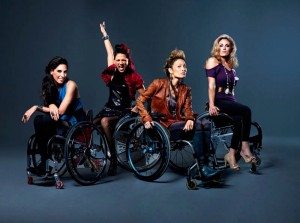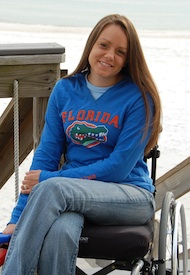 This week the Sundance Channel premiered Push Girls, a new reality series about four women in wheelchairs. All of them have spinal cord injuries at various levels. Like me, three of them were paralyzed from car accidents, one from a ruptured blood clot in her spinal cord.
This week the Sundance Channel premiered Push Girls, a new reality series about four women in wheelchairs. All of them have spinal cord injuries at various levels. Like me, three of them were paralyzed from car accidents, one from a ruptured blood clot in her spinal cord.
After watching the first episode, I can’t say that it’s exactly family-friendly television. Maybe it will get better as the show progresses, but as for the first episode, one of the girls talks openly about an on-again-off-again sexual relationship (yes, we can still have sex and get pregnant) she’s in with a man and then the cameras follow her to a club on a date with another woman.
Nevertheless, I’m excited about this series. It’s great not because it shows the challenges that those of us in wheelchairs face, but for showing what we’re still capable of and how life can still be enjoyed post-injury.
Personally, my injury has been a major lesson in patience and humility on many different levels. I talk a lot about life with a disability, often in terms of accepting suffering and physical weakness, but what I’ve really come to find after nearly 13 years in a wheelchair is that often the hardest part about living with a disability is not coming to terms with what I can’t do anymore, but dealing with the perception that I am more helpless than I really am.  Sometimes people will really go out of their way to try to help or do things for me that I can easily do myself (especially when they see me getting in and out of my car).
Sometimes people will really go out of their way to try to help or do things for me that I can easily do myself (especially when they see me getting in and out of my car).
Don’t get me wrong, I appreciate the generosity and I’m happy to know there are so many people willing to help others, but, having so many limitations as it is, I like to do the things that I still can do for myself, especially when I’m around someone who is not familiar with me and my situation.
Besides that, there are the hard-to-ignore sympathetic looks and pats on the back from passers-by and the surprised reaction I frequently get from people who can’t believe that I could have such a positive attitude about my life. Though they don’t come right out and say it, it’s not hard to imagine what they are thinking.
We’ve come a long way in helping people with disabilities become more active and involved in our communities and work-forces, but it seems we have not yet relieved the general assumption that life with a disability is unbearable or less fulfilling. In fact, 52% of the people in our country admit that that they would rather be dead than disabled.
This able-bodied view of life with a disability – dark, limiting, lonely, depressing – is why so many unborn children are killed after a poor prenatal diagnosis. It’s also why people advocate for sick and disabled people to have access to assisted suicide services or allow, even encourage, family members to starve their severely handicapped loved ones who can’t speak for themselves. In reality, however, most people actually in these situations (including myself) are quite happy to be alive and want to stay that way.
I’m not suggesting that life with a disability is always easy, but then, whose life is, really? Physically, mentally, emotionally, we all face challenges. Some are bigger than others, but it’s not always as bad as it seems, or it doesn’t have to be. As the saintly genius, Fr. Richard Neuhaus once said, “as long as we are alive, we have all the life there is.” We just have to be willing to see that.
New episodes of Push Girls air on the Sundance Channel every Monday at 10 pm, EST. with re-runs throughout the week. See schedule here. You can also watch the first episode and other clips online at Hulu.com. Here’s a preview:
I like what Mia said in this appearance on the Ellen Show:
We’re all looking for a lot of cures in this world and the one cool thing is, there is a cure for ignorance. It’s out there. We have it. And it’s awareness.
I applaud the Sundance Channel for putting this show out there. I hope it will make at least some small difference in the way people think about life with a disability.



